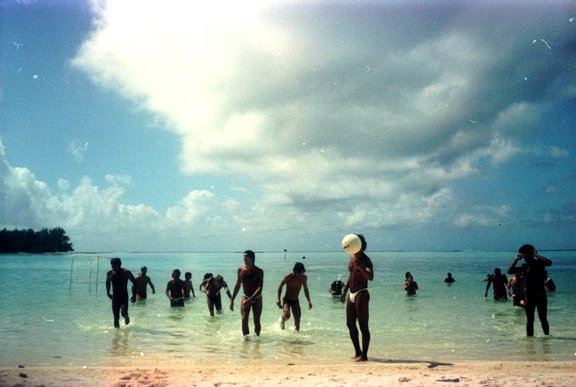Double Exposure
Autumn had turned with the leaves settled in a suspicious shade of crimson red. Two of my old college friends had come down together from the city to see me. It'd been years since I'd seen either of them; it gave me some fickle comfort to know they hadn't changed all that much.
Erin was still her usual cast of shy, warily collecting thoughts behind her big eclipsed eyes. Sat beside her in the shade, Joel played up his typical character: The ragged outcast, forever flipped-out and daydreaming aloud. Altogether, it was just like days past. Whenever we weren't looking at each other, we quickly found ourselves staring off in the same direction.
Joel began the afternoon by enthusiastically filling his glass to the brim. 'You bought us down here. You know I had to bring a bottle of Fire Band for old-times sake.' He said, cheerily presenting it to me as he poured near vertically into the glass.
'Careful, it's not like we're in any rush.' Erin said, snatching the bottle from his hand and side-eyeing me with a warm smile. She'd always been Joel's sensible foil - an aspect of their friendship I knew she'd always secretly enjoyed.
'Why did you call together little this reunion anyway.' Joel asked me. It was safe to assume his fondness for high volume wine hadn't done much to improve his memory.
'I inherited the old place a couple of months ago. I thought you and Erin might like to come by. You both spent a lot of time here back in the day.' I replied, gesturing to the small acreage my grandfather had kept meticulously into his final years.
'I'm kind of amazed you hadn't told us sooner. It's incredible, especially the massive garden. You're so lucky your grandparents left it to you.' Erin replied, looking around, compulsively folding her sunglasses to occupy her hands.
It was an enormous, rustic house even by the standards of its time. Despite it residing in some kind-of rural limbo, she was right. I was very fortunate to have somewhere to call my own.
'I think she's a touch jealous. Erin was telling me on the way down, she wants to move back here.' Joel said, butting into the conversation on her behalf.
'I think it'd be nice, you know, to settle down somewhere quiet. Life in the city doesn't quite agree with me anymore.' She said the last part with sad emphasis, one disguising some weighty underlying reason - it went directly over Joel's head.
'What do you make of that one, country boy?' Joel nudged me as he shuffled in his seat in the shade. 'I don't think she should. I mean, I couldn't do it. There's nothing to do out here. I'd end up going crazy.' He sounded cheerfully manic, answering a question he'd asked of himself.
'As much as I'd love to welcome you back, I think he's right. It's not like there's a whole lot to do around here.'
'Yeah well, You were never easily pleased, were you.' She said, telling me rather than asking. 'Either way, I'd believe you over Joel any day. Even if it doesn't do much to change my mind.'
'Yeah, I wouldn't take what I say too seriously; you know me, anything to keep the conversation going.' He replied to her with the slanted beginnings of a tipsy grin.
We toasted Erin's honorary return to her home town. The ceremonial charade bought a beautiful, fey smile to her face. A smile that remains ever vivid to me, even now.
As we all exhaled into restful silence, Erin lay down on the grass, gazing at our sheltering maples' thinning red foliage. 'You must be behind season down here as well. I totally forgot the leaves could look like this.' She picked one from off the ground, examining it between two pale fingers.
'I wouldn't really know, but it's certainly a sturdy tree. It's been here for as long as I can remember. The old man loved it, said it was the heart of the garden.'
His eco-sentimentalism went more or less unnoticed. Erin got up and wandered slowly around the maple, vacantly inspecting it. Not long after, Joel circled behind, following along the same path as if to spell out her interest and the tree's very state of existence for himself.
'Well, I don't know much about them either. Certainly glad it's here though, it's far too hot today!' he exclaimed to the open air. 'Actually, just walking around made my head spin. I must of started up too fast.' He murmured and dragged himself back into the shade to seek refuge.
'It's probably from the heat. I told you to slow down. You're such an idiot sometimes.' Erin called back to him. She sighed and crouched down next to me. 'Hey, we need to get some water out here for Joel. We could probably all do with some.'
'You can drink from the stream at the end of the garden. The water's from the springs run-off, it's clean.' I said to both of them, reaching over and patting Joel on the back.
They looked surprised by the notion, but the suggestion was met with no hesitation. Over at the stream-side, the water was crystal clear and slow-running, just as promised. They cupped their hands and reached into the brook, drinking hastily from it. The water appeared to bring them some equilibrium from the heavy dazes of the autumn sun.
Eventually, they wandered back over to me, skin glimmering before turning opaque against the light. Stirred by some faint feeling of introspection, the whole image seemed curiously foreign, unreal. When I reached over to sip my drink, the pair sat back down to join me. That was when the day really began to slip into blurry motion.
Joel led the conversation by his drunken urgency to be heard. Hours rolled by, the way they always do in friendly company. Extensive discussions followed amusing and facetious arguments entailing the many, almost unbelievable days now past us. Poking fun at each other for the embarrassing situations we'd put one another through. Tipping bottles and glasses in a rosy stupor to times when we had met with strange and hilarious misfortunes. All the things discussed by friends who have drunk too much and spoken too little.
It wasn't long until the day moved into the evening, and the heat showed no sign of letting up.
Erin had turned back from the shallow waters where she'd been peacefully keeping her space and dipping her feet. She returned in small careful steps, hands covering her eyes to see past the golden hour glare.
Joel had spent the last hour hiding away in the shade, still reeling from the impact of his eagerness. 'Man, I have a terrible headache and it's putting me in some weird mood.' He said to us, woozily swaying about underneath the branches.
'What kind of weird?' Erin gave a half-hesitant response, likely fearing the potential for a darker turn.
'You know me, stretching my time between two places.' He said, laughing along with his vague statement. Misguided profundities were the other direction he'd run in when deeply drunk.
Neither of us could be sure, but it seemed we were safe. Even though he'd been draining glasses at an incredible pace, Joel looked to be going out on high. Stood beside me, Erin was also beginning to look a little more glazed-over than usual, albeit in her typically well-composed way. I shifted my focus away from her, and Joel started up again.
'Hey, remember back in college, when you said that the three of us would always hang out, you know, be friends.'
'Sure.' We both replied in unison, not knowing which of us he was talking to.
'Isn't it cool how after all this time, nothing's changed. I mean, it seems like we're all pretty much still the same.' Joel said, slurring his speech and beaming at us with his wide goofy smile.
'Yeah, I suppose so. It definitely doesn't seem like any of us have gotten any more real than we were before.' She joked, watching as he stumbled about, comically maudlin and going on and on.
After some more blind swaying, he eventually settled, and that was it; the last sincere thing that any of us said to one another that day. Erin lay down with Joel next to her in the shade. Tilted back with arms rested at their sides. Somehow it was just as Joel had said: Two people, in two different places, fading off into some sweetly shared reverie.
I wandered back into the house the last time, returning with an old patchwork blanket. I covered both of them up and then joined them on the grass. When I'd settled in, Erin rested her head on my shoulder. As I slowly blinked my eyes, the world outside of our small sun-sanctuary became a hazy blur. The music of chirping birds had come to a hush. In this place that was once our own floating island: All eyes had closed.
I think I knew, as I lay there, that the glow surrounding that day would eventually come to illustrate my better times. For my part, I hope you've enjoyed it. If nothing else, it's made for a fantastic distraction, reaching back to piece together memories like scenes in a script. Yes, the story has come to a close. But there's one last drift. It's time to talk and relieve ourselves of allusion. How are you wrapped up in this unwinding yarn?
It's nice to lose yourself in the comforts of the past sometimes, maybe memories of long-lost friends, memories you keep innocently for yourself, memories to remind you of better times. That is, it is for me.
In your case, this is more like a borrowed world, a second-hand imagining for you to attach your own faces; your own desires too. What do you think? Do we partake in these vicarious worlds for temporary comfort? Will those like us become truly reliant on escapism for solace? To tell the truth, I don't find that memories and fantasies are all that different to me anymore.
Please don't mistake my intentions here for being in any way nefarious. You can trust that I don't think that way of yours. After all, I wrote this recollection for you. A blank slate, an open invitation to join me; tangle yourself in the transparent threads of some nostalgic cat's cradle.
I guess this little addendum doesn't matter much; it's worth mentioning, that was the last time I saw Erin or Joel, for that matter. That next day, leaving behind a goodbye note and the town itself.
I don't need to tell you that when you're looking back on good times, it's easy to fill the spaces between details with minor fiction: Believe me, they change every time we look back. We both know these casual epiphanies aren't worth your time, so I'll get to the pressing matter, as my limited time is running across this cream-coloured horizon.
I know you're here because you don't want to be alone, but I have a solution - You could always go back to the start. There'll always be a spot for you here with us, under the tree that bears rose-tinted leaves. Then again, maybe you'd prefer to sit by the stream. Now that I think about it, the water was never as clear again.
Come sit in the shade. Quench your thirst. If you've made it this far, you know there's only one thing left that matters: Who's sat with you in that place you're picturing right now?
Robert is an aspiring writer from Devon in the U.K. He has previously been shortlisted in national competitions.







